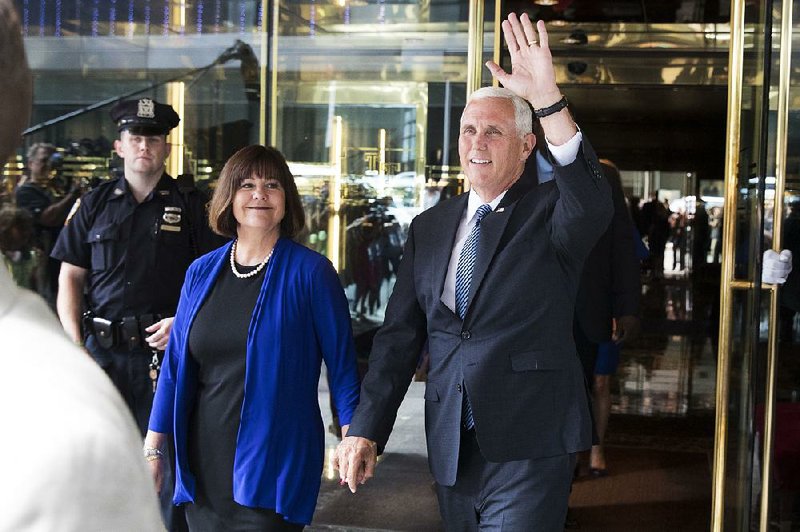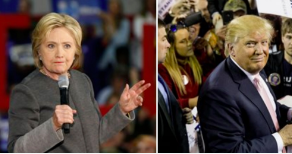Donald Trump named Gov. Mike Pence of Indiana as his running mate Friday, adding to the Republican ticket a traditional conservative who boasts strong credentials with the Christian right, and ending a muddled vice presidential selection process.
Trump had said Thursday night that he intended to delay the unveiling of his running mate out of respect for the attack in Nice, France. The moment, he said on television, was not right.
Instead of a rollout in a Manhattan hotel, as his campaign had planned, Trump named Pence to the Republican ticket by way of Twitter.
"I am pleased to announce that I have chosen Governor Mike Pence as my Vice Presidential running mate," Trump wrote in a Twitter message delivered at 10:50 a.m.
He said he and Pence would hold their first joint event this morning at the Hilton Midtown hotel in New York. The campaign previously committed to a joint interview on 60 Minutes on CBS.
The duo will head to Cleveland next week for the Republican National Convention.
As Pence arrived for a private meeting Friday with Trump, he told reporters that he "couldn't be more happy for the opportunity to run with and serve with the next president of the United States."
FULL ELECTION COVERAGE
Kellyanne Conway, a Trump strategist who also is a longtime Pence adviser, said in an interview that the pair would "complement each other in tone and content and style," and dismissed speculation by some political consultants that Pence's folksy personality would not click with Trump.
"Pence has a very latent and very robust sense of humor that will surface fairly quickly," Conway said. She also described him as an attack dog ready to take on Democratic presidential candidate Hillary Clinton only at "5 or 6 decibels" and said that his understated presence would "calm a lot of donors and voters" about state and regional elections.
Hillary Clinton's Democratic campaign criticized Pence on Friday as "the most extreme pick in a generation," citing his advocacy for defunding Planned Parenthood, restricting abortion rights and signing a so-called religious-freedom law that would protect businesses if they denied services on the basis of religious outlook.
John Podesta, Clinton's campaign chairman, said Trump had reinforced "some of his most disturbing beliefs by choosing an incredibly divisive and unpopular running mate known for supporting discriminatory politics and failed economic policies."
Clinton spent Friday in meetings in Washington about her own vice presidential choice. Sen. Elizabeth Warren and Colorado Gov. John Hickenlooper were seen in separate cars that left Clinton's home. Housing Secretary Julian Castro also met with Clinton, according to a person familiar with the meeting who spoke on condition of anonymity to describe the private gathering.
republicans satisfied
The reaction to the Pence choice from Republican officials, meanwhile, was overwhelmingly positive.
Former House Speaker Newt Gingrich, one of the finalists for the vice presidential spot, said he was "very comfortable" with Trump's decision and praised Pence as someone who could help unite the party.
"It was a pick that clearly shows he is pivoting to the general election," said GOP chairman Reince Priebus, who was in the midst of an interview when Trump announced his decision. "He is choosing a person who has the experience inside and outside Washington, Christian conservative, very different style that I think shows a lot of maturity."
In his interview, Priebus affirmed a unified national convention despite calls for allowing delegates to vote for the candidate of their choice.
"There is no other candidate," Priebus said, after some delegates failed to change party rules the night before. "That was one of the problems that this 'Never Trump' issue had last night. Who is the other candidate? What VP nominees are you vetting? We're voting next week -- on Tuesday or Wednesday. What money are you raising? Where is this person?"
Preibus also mentioned that his party was ready to welcome an openly gay speaker to the convention, and he praised Trump for backing off a divisive plan to ban Muslim immigrants.
PayPal co-founder Peter Thiel, who is gay, will be a featured speaker on a National Republican Convention stage.
"We're still a party that believes that marriage is between one man and one woman, but it doesn't mean that we're going to kick people out," he said, describing opposition to gay marriage as "one of the bedrock issues of our party."
policy differences
Pence, 57, spent 12 years in Congress before winning the governor's seat.
Trump has long said he wanted a running mate with governing experience who could help him enact his agenda in Washington.
However, Pence's gubernatorial tenure has been marked by debate over a religious-freedom state law considered by critics to be discriminatory against gays and has alienated Democrats, who consider him a rigid, socially conservative ideologue.
He has numerous policy differences with Trump. The governor has been a longtime advocate of trade deals such as the North American Free Trade Agreement and the Trans Pacific Partnership, both of which Trump opposes. Pence also had been critical of Trump's proposed temporary ban on foreign Muslims entering the United States.
"Calls to ban Muslims from entering the U.S. are offensive and unconstitutional," Pence wrote on Twitter in December. "Our Constitution guarantees the free exercise of religion. The U.S. cannot discriminate on the basis of religion."
In his first TV interview since joining the Republican ticket, Pence told Fox News on Friday night that he supports Trump's call to "temporarily suspend immigration from countries where terrorists' influence and impact represents a threat to the United States."
Trump and Pence also differences on social issues. Unlike Trump, Pence wants to make abortion illegal even in cases of rape and incest, and co-sponsored a proposal in 2011 to redefine rape cases connected to abortion laws as "forcible rape."
Along with domestic policy, Trump and Pence have had disagreements on foreign policy.
As a congressman, Pence voted in 2002 to authorize the war in Iraq, which Trump has attacked Clinton for supporting when she was in the Senate.
not an easy decision
Trump and Pence, who have gotten to know each other after Trump's primary win in Indiana, engaged in a whirlwind courtship over the past week, holding a rally together in Indiana and meeting several times in private.
Throughout Thursday, Trump wavered over his selection of Pence, people briefed on the discussions said, speaking on the condition of anonymity to describe Trump's private venting. He expressed anger to campaign aides over news media reports that his advisers were informing political allies of the Indiana governor's selection and bristled at the idea that he was locked into the choice.
In a phone call with members of the campaign leadership, Trump questioned whether Pence really was the right choice, and Paul Manafort, the campaign chairman, reiterated the case for choosing Pence, according to a person briefed on the call.
He also held a midnight conference call with his top aides to discuss the situation, according to two people with knowledge of the call.
But Manafort rejected suggestions that the candidate considered changing his mind about Pence.
"Never waffled once he made his decision," Manafort wrote in an email.
Trump arrived back at his home at Trump Tower early Friday after a red-eye flight from Los Angeles, where he had meetings and fundraisers.
Later in the morning, all plans were back on track.
Trump sent out the Twitter message, and moments later, one of Pence's aides filed paperwork with the Indiana secretary of state's office withdrawing him from the governor's race.
Pence was up for re-election, and state law prohibits candidates from being on ballots in two contests; the deadline to file for the race was noon Friday. He will be replaced by another candidate selected by the Indiana Republican Party.
Pence's eleventh-hour withdrawal from the governor's race touched off a hectic scene in Indianapolis. After hours of anticipation at the Statehouse there Friday, Matt Morgan, a lawyer for Pence's campaign for governor, made his way through a gaggle of television cameras camped in the lobby of the Indiana secretary of state's office, holding the governor's papers to withdraw from the race.
Information for this article was contributed by Alexander Burns, Maggie Haberman and Thomas Kaplan of The New York Times; by Julie Pace, Brian Slodysko, Julie Bykowicz, Ken Thomas, Jon Lemire, Jill Colvin, Alan Fram and Steve Peoples of The Associated Press; by Philip Rucker and Robert Costa of The Washington Post; and by Sahil Kapur of Bloomberg News.
A Section on 07/16/2016

